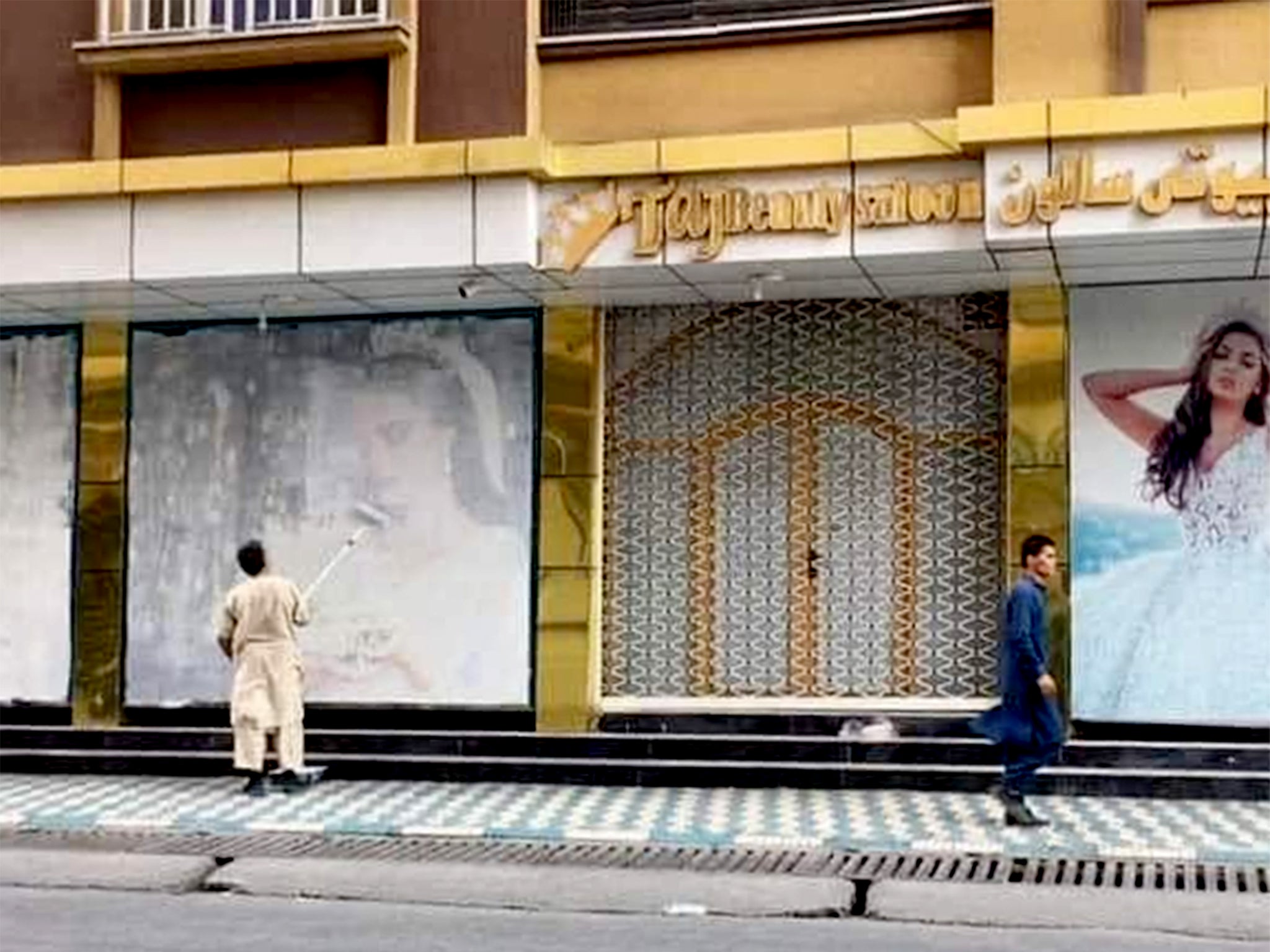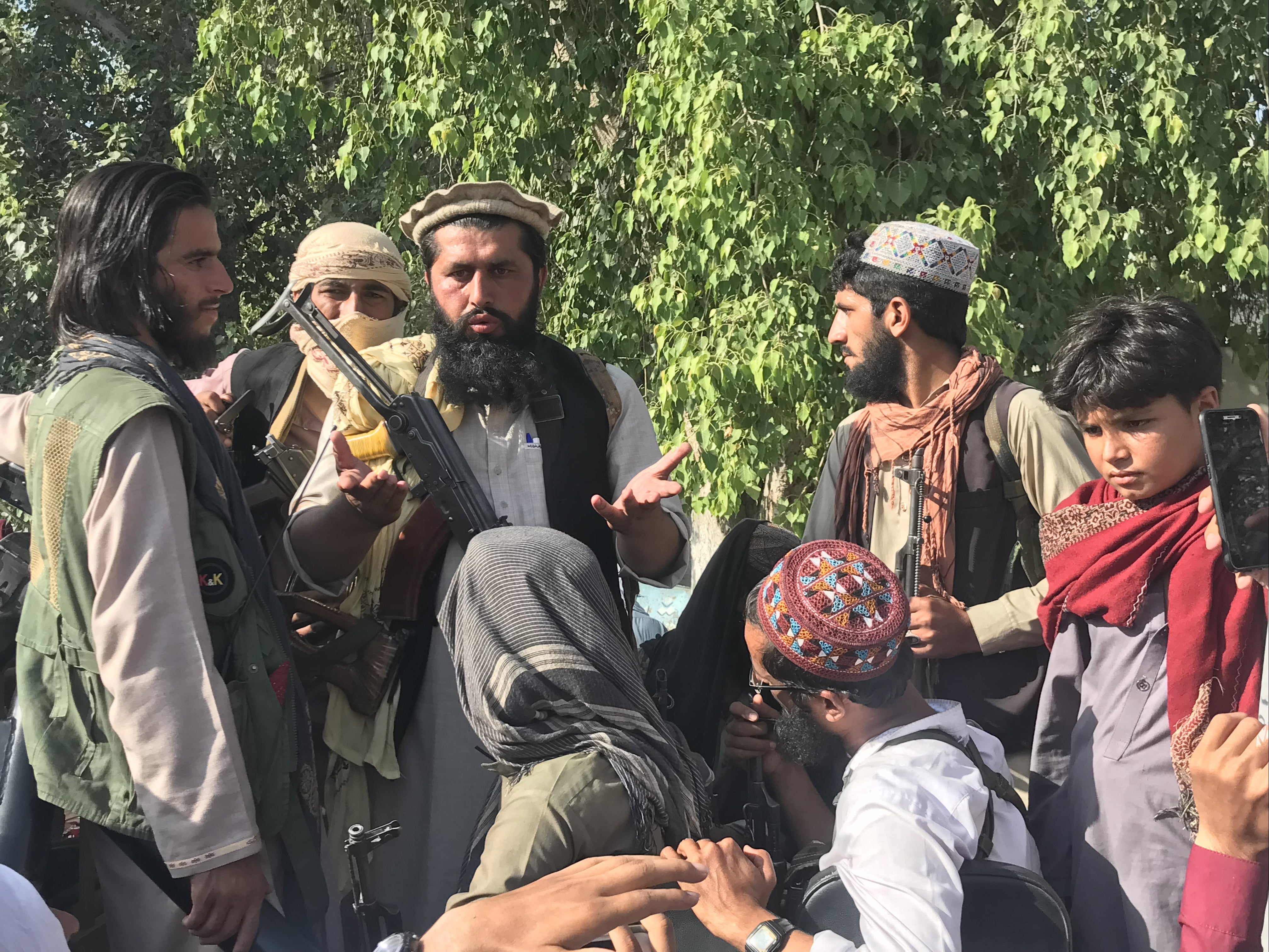Ads depicting women ‘painted over’ after Taliban enters Kabul
Man seen covering images of women in wedding dresses outside beauty salon despite claim militant group ‘will respect rights of women’

Adverts of women wearing wedding dresses appear to have been painted over in Kabul after Taliban fighters entered Afghanistan’s capital.
A man can be seen using a roller and white paint to cover up the large images outside a building in a photograph posted on Twitter by an Afghan journalist on Sunday.
The adverts appear to be outside Taj Beauty Salon, which describes itself as “the best bridal beauty salon in Afghanistan”.
A video posted on the business’s Facebook page in March this year shows models posing in wedding dresses in two of the adverts situated either side of the entrance to the salon.
The incident comes despite a Taliban spokesperson’s claim the militant group “will respect rights of women” when it takes control of Afghanistan.
Suhail Shaheen told BBC News: “We will respect rights of women ... our policy is that women will have access to education and work, to wear the hijab.”
He restated the Taliban’s position that “no one should leave the country ... we need all the talents and capacity, we need all of us to stay in the country and participate”.
His comments followed reports a day earlier that women were sent home from their jobs in fallen provinces and told to leave universities in some instances.

In early July, as Taliban insurgents were seizing territory from government forces across Afghanistan, fighters from the group walked into the offices of Azizi Bank in the southern city of Kandahar and ordered nine women working there to leave.
The gunmen escorted them to their homes and told them not to return to their jobs. Instead, they explained that male relatives could take their place, according to three of the women involved and the bank’s manager.
“It’s really strange to not be allowed to get to work, but now this is what it is,” said 43-year-old Noor Khatera, who had worked in the accounts department of the bank.
“I taught myself English and even learnt how to operate a computer, but now I will have to look for a place where I can just work with more women around.”
The incident is an early sign that some of the rights won by Afghan women over the 20 years since the hardline Islamist militant movement was toppled could be reversed.
The Taliban has steadily overrun the country since US troops began withdrawing in May and the insurgents entered the capital on Sunday.
When the group last ruled Afghanistan, from 1996 to 2001, women could not work, girls were not allowed to attend school and women had to cover their faces and be accompanied by a male relative if they wanted to venture out of their homes.
Women who broke the rules sometimes suffered humiliation and public beatings by the Taliban’s religious police under the group’s strict interpretation of Islamic law.
During hitherto fruitless talks over a political settlement, Taliban leaders made assurances to the West that women would enjoy equal rights in accordance with what was granted by Islam, including the ability to work and be educated.
Two days after the episode at Azizi Bank, a similar scene played out at a branch of another Afghan lender, Bank Melli, in the western city of Herat, according to two female cashiers who witnessed it.

Three Taliban fighters carrying guns entered the branch, admonishing female employees for showing their faces in public. Women there quit, sending male relatives in their place.
Taliban spokesperson Zabihullah Mujahid did not respond to a request for comment about the two incidents, nor did the two banks involved.
On the broader question of whether women would be allowed to work in banks in areas it controls, Mr Mujahid added that no decision had yet been made.
“After the establishment of the Islamic system, it will be decided according to the law, and God willing, there will be no problems,” he said.
The United States and others western powers fear the Taliban will roll back many of the freedoms won by women.
Gains for women’s rights are considered to be among the biggest accomplishments of the 20 years that US-led forces have been deployed in Afghanistan, although they have mostly been made in urban centres.
Afghan women working in fields including journalism, healthcare and law enforcement have been killed in a wave of attacks since peace talks began last year between the Taliban and the US-backed Afghan government.
The government blames most of the targeted killings on the Taliban, which denies carrying out the assassinations.
Scores of Afghan women took to social media to appeal for help and express their frustration.
“With every city collapsing, human bodies collapse, dreams collapse, history and future collapse, art and culture collapse, life and beauty collapse, our world collapses,” Rada Akbar wrote on Twitter. “Someone please stop this.”
Malala Yousafzai, an activist for female education and the youngest Nobel Prize laureate, tweeted: “We watch in complete shock as Taliban takes control of Afghanistan.
“I am deeply worried about women, minorities and human rights advocates.
“Global, regional and local powers must call for an immediate ceasefire, provide urgent humanitarian aid and protect refugees and civilians.”
Additional reporting by Reuters
Join our commenting forum
Join thought-provoking conversations, follow other Independent readers and see their replies
Comments




Bookmark popover
Removed from bookmarks